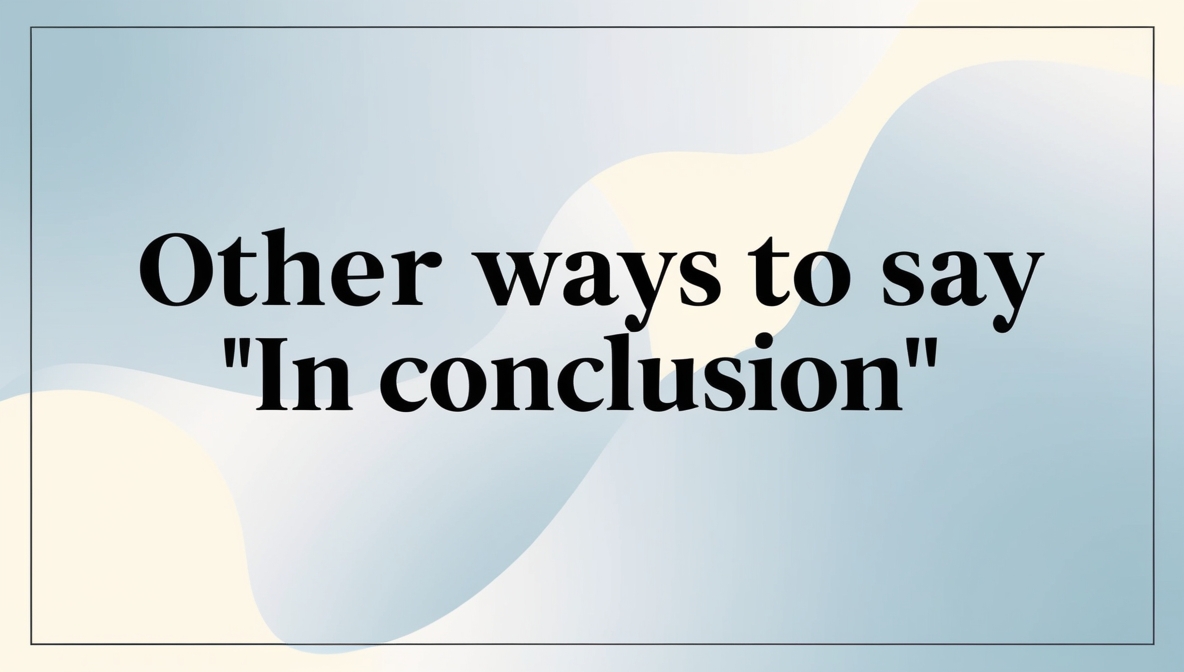Are you looking for other ways to say “in conclusion”? You’re not alone! Many of us find ourselves relying on the same phrases, which can make our communication feel stale. Whether you’re writing a report, giving a presentation, or simply trying to wrap up a conversation, using varied expressions can enhance your message and engage your audience.
In this article, you’ll discover a curated list of creative alternatives that will not only elevate your language but also make your conclusions more impactful. Say goodbye to repetitive phrases and hello to fresh, compelling ways to summarize your thoughts. Let’s dive in!
1. To Summarize
When to Use
This phrase is ideal for formal presentations or academic writing. It signals to your audience that you are about to recapitulate key points.
Example
“To summarize, our findings indicate a significant correlation between sleep patterns and productivity levels.”
2. In Summary
When to Use
Use this phrase when you want to succinctly wrap up a discussion or report. It is suitable for both spoken and written contexts.
Example
“In summary, the new marketing strategy has proven effective in increasing brand awareness.”
3. Ultimately
When to Use
“Ultimately” is best employed in persuasive writing or speeches where you want to emphasize the final outcome of your argument.
Example
“Ultimately, the decision to invest in renewable energy sources will benefit both the environment and the economy.”
4. All in All
When to Use
This phrase is more conversational and works well in informal discussions, team meetings, or presentations.
Example
“All in all, it was a productive meeting that set clear goals for the upcoming project.”
5. In Closing
When to Use
This phrase is appropriate for formal presentations or speeches, providing a clear signal that you are wrapping up your thoughts.
Example
“In closing, I would like to thank everyone for their contributions to this project.”
6. To Wrap Up
When to Use
Use this expression in less formal settings, such as team discussions or casual presentations, to indicate that you are finishing your thoughts.
Example
“To wrap up, let’s review the action items before we adjourn.”
7. As a Final Point
When to Use
This phrase is effective in both written and spoken communication when you want to emphasize an important aspect before concluding.
Example
“As a final point, remember that good communication skills are essential for teamwork.”
8. In Retrospect
When to Use
“In retrospect” is ideal for reflective writing or discussions where you evaluate past events and their implications.
Example
“In retrospect, the challenges we faced ultimately strengthened our resolve and teamwork.”
9. To Conclude
When to Use
This straightforward phrase is suitable for formal writing and presentations, offering a direct transition to your final thoughts.
Example
“To conclude, our research highlights the importance of mental health in educational settings.”
10. In Essence
When to Use
Use this phrase when you want to distill complex ideas into their core message, making it effective for analytical writing.
Example
“In essence, our approach prioritizes user experience over everything else.”
11. Overall
When to Use
“Overall” serves well in summaries of reports or presentations, providing a holistic view of the discussion.
Example
“Overall, the project has exceeded initial expectations in terms of both budget and timeline.”
12. To Sum Up
When to Use
This phrase is versatile for both formal and informal contexts and is useful when you wish to encapsulate key points succinctly.
Example
“To sum up, we have covered the main aspects of the new policy changes.”
13. In Brief
When to Use
“In brief” is effective when you want to provide a quick recap, suitable for both spoken and written forms.
Example
“In brief, the study confirms the need for more comprehensive training programs.”
14. Thus
When to Use
“Thus” can be employed in more scholarly or technical writing, indicating a conclusion drawn from the preceding discussion.
Example
“Thus, the data supports our hypothesis regarding consumer behavior changes.”
15. In Final Analysis
When to Use
This phrase is best suited for analytical writing or discussions, particularly when summarizing findings or opinions.
Example
“In final analysis, the successes we achieved were the result of collaborative effort and innovation.”
Conclusion
Enhancing your vocabulary with alternative phrases to “in conclusion” can significantly improve your communication skills. By incorporating these expressions into your writing and speaking, you not only add variety but also strengthen your message. Remember, the context in which you use each phrase is crucial; choose the one that best fits the tone and purpose of your communication. With these tools at your disposal, you can express your thoughts with confidence and clarity, encouraging you to continue exploring and expanding your linguistic repertoire.

